Moral Believer or Moral Problem-Solver? Moral Pragmatism Fosters Tolerance Without Impeding Moral Behavior
Abstract
1. Introduction
1.1. Traditional Perspectives on Moral Beliefs
1.2. Morality as a Problem-Solving Tool
1.3. The Present Research
2. Study 1
2.1. Method
2.2. Results
2.3. Discussion
3. Study 2
3.1. Method
3.2. Results
3.3. Discussion
4. Study 3
4.1. Method
4.2. Results
4.3. Discussion
5. Study 4
5.1. Method
5.2. Results
5.3. Discussion
6. General Discussion
7. Conclusions
Supplementary Materials
Author Contributions
Funding
Institutional Review Board Statement
Informed Consent Statement
Data Availability Statement
Conflicts of Interest
Appendix A
References
- Skitka, L.J.; Hanson, B.E.; Morgan, G.S.; Wisneski, D.C. The psychology of moral conviction. Annu. Rev. Psychol. 2021, 72, 347–366. [Google Scholar] [CrossRef] [PubMed]
- Graham, J.; Nosek, B.A.; Haidt, J.; Iyer, R.; Koleva, S.; Ditto, P.H. Mapping the moral domain. J. Personal. Soc. Psychol. 2011, 101, 366–385. [Google Scholar] [CrossRef]
- Tetlock, P.E. Thinking the unthinkable: Sacred values and taboo cognitions. Trends Cogn. Sci. 2003, 7, 320–324. [Google Scholar] [CrossRef] [PubMed]
- Fowers, B.J.; Richardson, F.C. Why is multiculturalism good? Am. Psychol. 1996, 51, 609–621. [Google Scholar] [CrossRef]
- Lu, J.G.; Quoidbach, J.; Gino, F.; Chakroff, A.; Maddux, W.W.; Galinsky, A.D. The dark side of going abroad: How broad foreign experiences increase immoral behavior. J. Personal. Soc. Psychol. 2017, 112, 1. [Google Scholar] [CrossRef]
- Dewey, J.; Tufts, J.H. Ethics; Henry Holt and Company: New York, NY, USA, 1909. [Google Scholar] [CrossRef]
- Levine, S.; Kleiman-Weiner, M.; Schulz, L.; Tenenbaum, J.; Cushman, F. The logic of universalization guides moral judgment. Proc. Natl. Acad. Sci. USA 2020, 117, 26158–26169. [Google Scholar] [CrossRef]
- Kohlberg, L. Stage and Sequence: The Cognitive-Developmental Approach to Socialization; Rand McNally: Chicago, IL, USA, 1969. [Google Scholar]
- Turiel, E. The Development of Social Knowledge: Morality and Convention; Cambridge University Press: Cambridge, UK, 1983. [Google Scholar]
- Goodwin, G.P.; Darley, J.M. Why are some moral beliefs perceived to be more objective than others? J. Exp. Soc. Psychol. 2012, 48, 250–256. [Google Scholar] [CrossRef]
- Skitka, L.J. The psychology of moral conviction. Soc. Personal. Psychol. Compass 2010, 4, 267–281. [Google Scholar] [CrossRef]
- Tetlock, P.E.; Kristel, O.V.; Elson, S.B.; Green, M.C.; Lerner, J.S. The psychology of the unthinkable: Taboo trade-offs, forbidden base rates, and heretical counterfactuals. J. Personal. Soc. Psychol. 2000, 78, 853–870. [Google Scholar] [CrossRef]
- Skitka, L.J.; Bauman, C.W.; Sargis, E.G. Moral conviction: Another contributor to attitude strength or something more? J. Personal. Soc. Psychol. 2005, 88, 895–917. [Google Scholar] [CrossRef]
- Skitka, L.J.; Liu, H.F.; Yang, Y.; Chen, H.; Liu, L.; Xu, L. Exploring the cross-cultural generalizability and scope of morally motivated intolerance. Soc. Psychol. Personal. Sci. 2013, 4, 324–331. [Google Scholar] [CrossRef]
- Verkuyten, M.; Adelman, L.; Yogeeswaran, K. Tolerance as forbearance: Overcoming intuitive versus deliberative objections to cultural, religious, and ideological differences. Psychol. Rev. 2022, 129, 368–387. [Google Scholar] [CrossRef] [PubMed]
- Rai, T.S.; Holyoak, K.J. Exposure to moral relativism compromises moral behaviors. J. Exp. Soc. Psychol. 2013, 49, 995–1001. [Google Scholar] [CrossRef]
- Arceneaux, K. The roots of intolerance and opposition to compromise: The effects of absolutism on political attitudes. Personal. Individ. Differ. 2019, 151, 109498. [Google Scholar] [CrossRef]
- James, W. Pragmatism: A New Name for Some Old Ways of Thinking; Routledge: Abingdon, UK, 1907. [Google Scholar] [CrossRef]
- Rorty, R. Consequences of Pragmatism: Essays, 1972–1980; U of Minnesota Press: Minneapolis, MN, USA, 1982. [Google Scholar]
- Fesmire, S. John Dewey and Moral Imagination: Pragmatism in Ethics; Indiana University Press: Bloomington, IN, USA, 2003. [Google Scholar]
- Dewey, J. How We Think; D C Heath: Lexington, MA, USA, 1910. [Google Scholar] [CrossRef]
- Dewey, J. The Quest for Certainty; George Allen & Unwin LTD.: London, UK, 1929. [Google Scholar]
- Donelson, R. Ethical pragmatism. Metaphilosophy 2017, 48, 383–403. [Google Scholar] [CrossRef]
- LaFollette, H. Pragmatic ethics. In The Blackwell Guide to Ethical Theory; LaFollette, H., Persson, I., Eds.; John Wiley & Sons: Hoboken, NJ, USA, 1997; pp. 400–419. [Google Scholar]
- Richardson, H. Articulating the Moral Community: Toward a Constructive Ethical Pragmatism; Oxford University Press: Oxford, UK, 2018. [Google Scholar]
- Calhoun, C.W. (Ed.) The Gilded Age: Perspectives on the Origins of Modern America; Rowman Littlefield: Lanham, MD, USA, 2007. [Google Scholar]
- Margolis, J.D. Psychological pragmatism and the imperative of aims: A new approach for business ethics. Bus. Ethics Q. 1998, 8, 409–430. [Google Scholar] [CrossRef]
- Putnam, H. Pragmatism moral objectivity. In Women, Culture and Development; Nussbaum, M.C., Glover, J., Eds.; Oxford Academic: Oxford, UK, 1995; pp. 199–224. [Google Scholar] [CrossRef]
- Putnam, H. The Collapse of the Fact/Value Dichotomy and Other Essays; Harvard University Press: Cambridge, MA, USA, 2004. [Google Scholar]
- Rorty, R. The world well lost. J. Philos. 1972, 69, 649–665. [Google Scholar] [CrossRef][Green Version]
- Butt, T. Pragmatism, constructivism, and ethics. J. Constr. Psychol. 2000, 13, 85–101. [Google Scholar] [CrossRef]
- Drašček, M.; Rejc Buhovac, A.; Mesner Andolšek, D. Moral pragmatism as a bridge between duty, utility, and virtue in managers’ ethical decision-making. J. Bus. Ethics 2021, 172, 803–819. [Google Scholar] [CrossRef]
- Isaksen, S.G.; Treffinger, D.J. Celebrating 50 years of reflective practice: Versions of creative problem solving. J. Creat. Behav. 2004, 38, 75–101. [Google Scholar] [CrossRef]
- Shweder, R.; Much, N.; Mahapatra, M.; Park, L. Divinity and the “big three” explanations of suffering. In Morality and Health; Brandt, A.M., Rozin, P., Eds.; Routledge: New York, NY, USA, 1997; pp. 119–169. [Google Scholar]
- Greene, J.D.; Sommerville, R.B.; Nystrom, L.E.; Darley, J.M.; Cohen, J.D. An fMRI investigation of emotional engagement in moral judgment. Science 2001, 293, 2105–2108. [Google Scholar] [CrossRef] [PubMed]
- Reynolds, K.J.; Turner, J.C.; Branscombe, N.R.; Mavor, K.I.; Bizumic, B.; Subašić, E. Interactionism in personality and social psychology: An integrated approach to understanding the mind and behaviour. Eur. J. Personal. 2010, 24, 458–482. [Google Scholar] [CrossRef]
- Cheon, B.K. The diversity of cultural diversity: Psychological consequences of different patterns of intercultural contact and mixing. Asian J. Soc. Psychol. 2019, 22, 93–105. [Google Scholar] [CrossRef]
- Altemeyer, B. Dogmatic behavior among students: Testing a new measure of dogmatism. J. Soc. Psychol. 2002, 142, 713–721. [Google Scholar] [CrossRef]
- Nisbett, R.E.; Peng, K.; Choi, I.; Norenzayan, A. Culture and systems of thought: Holistic versus analytic cognition. Psychol. Rev. 2001, 108, 291–310. [Google Scholar] [CrossRef]
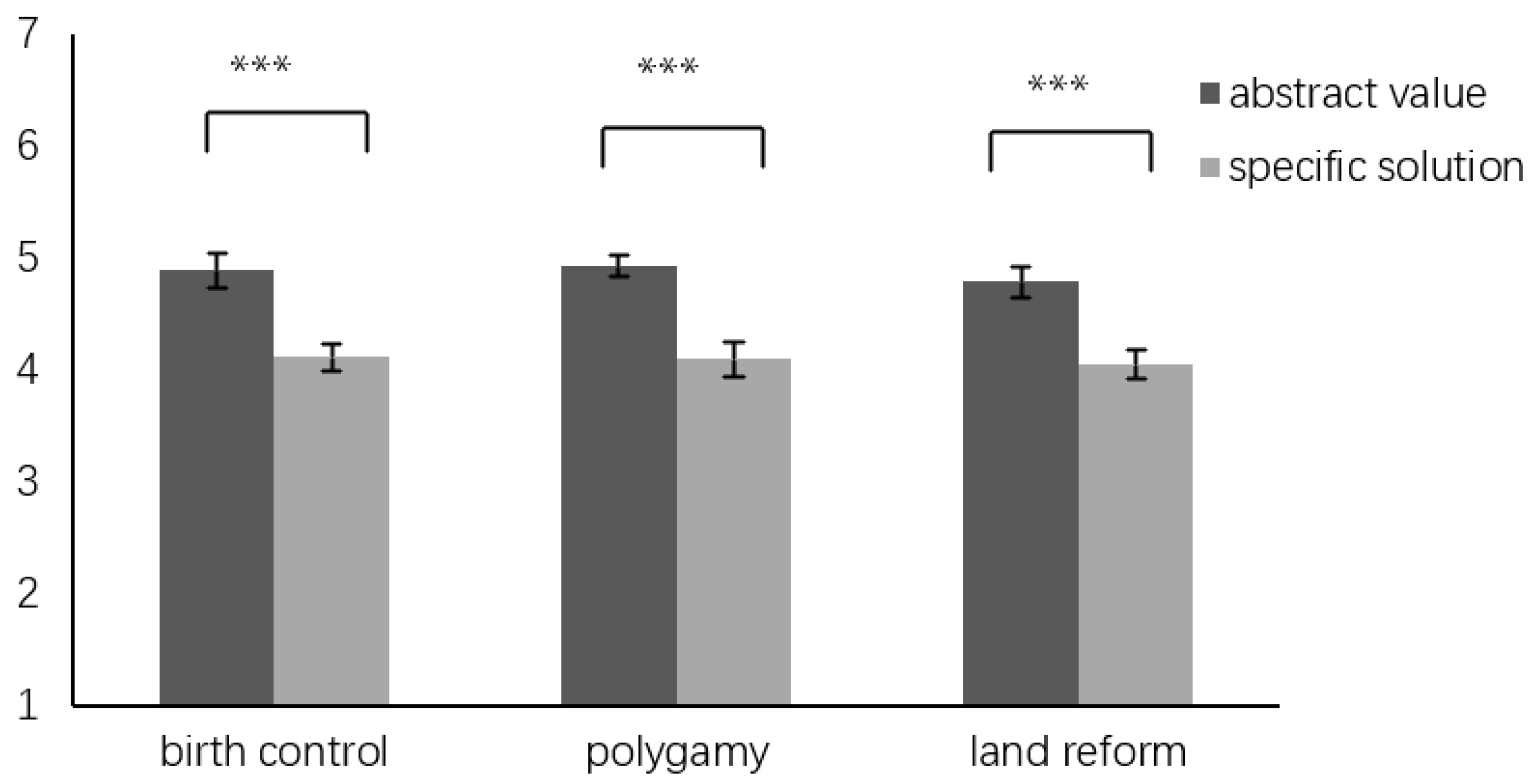

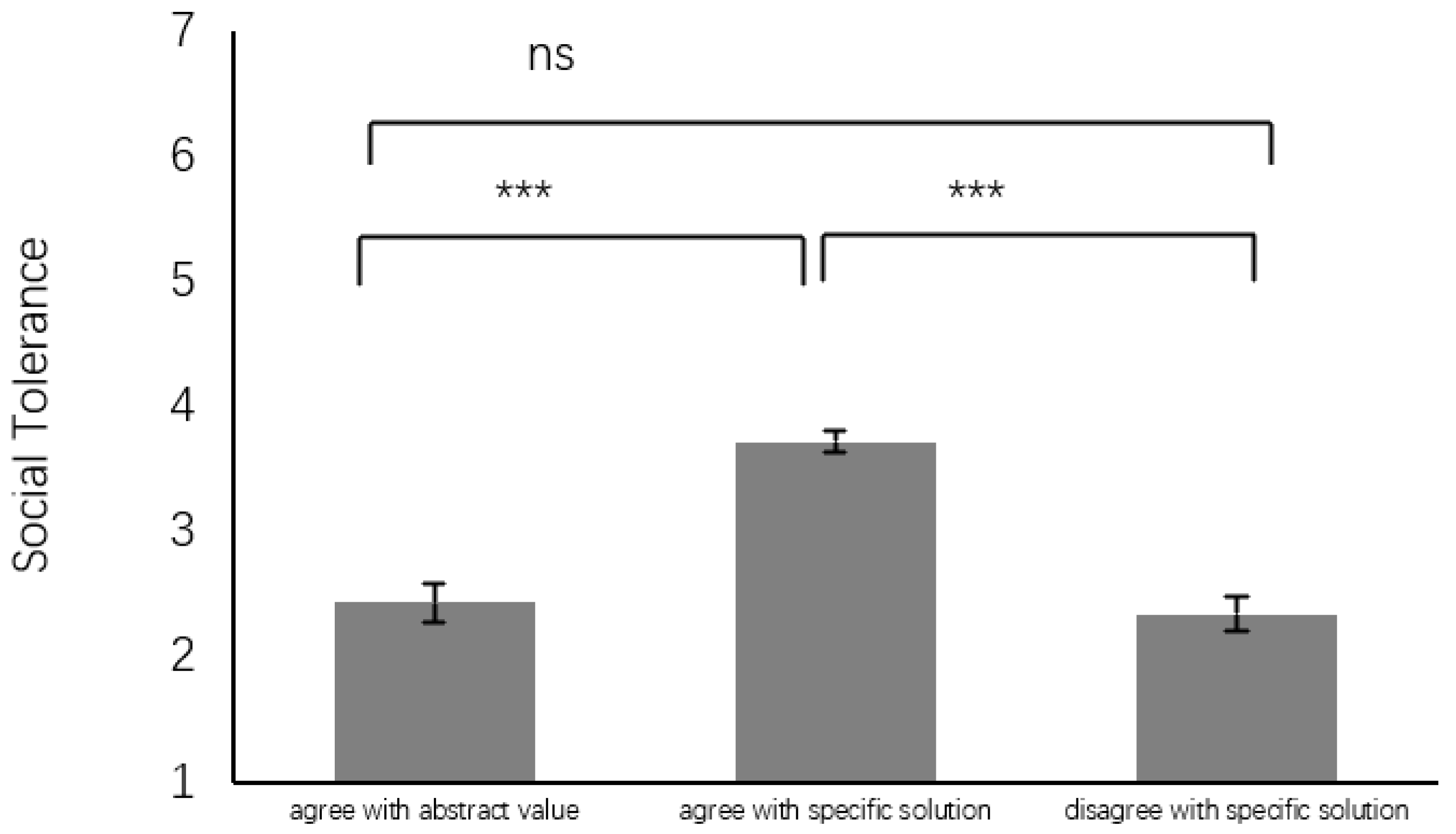
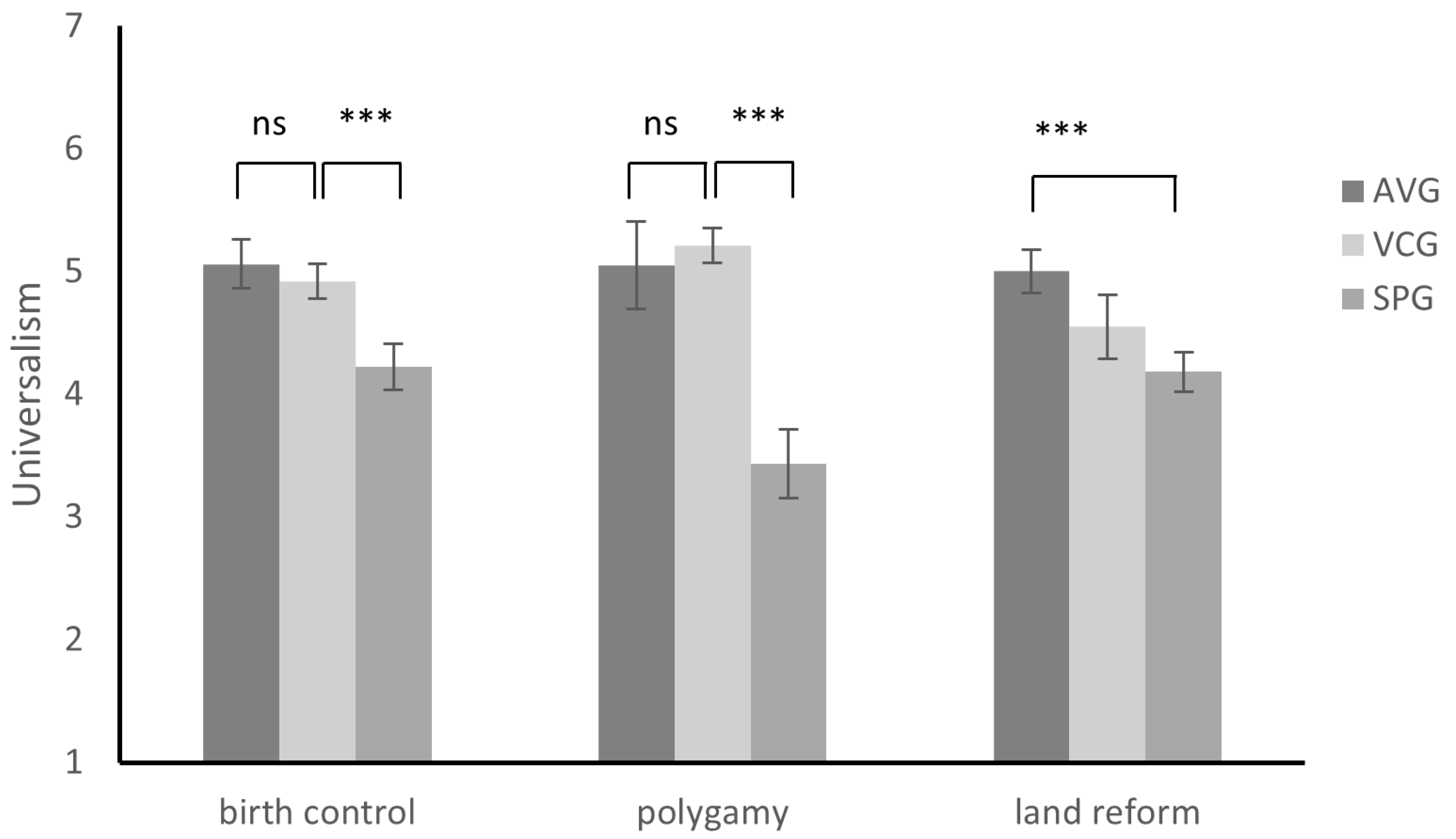
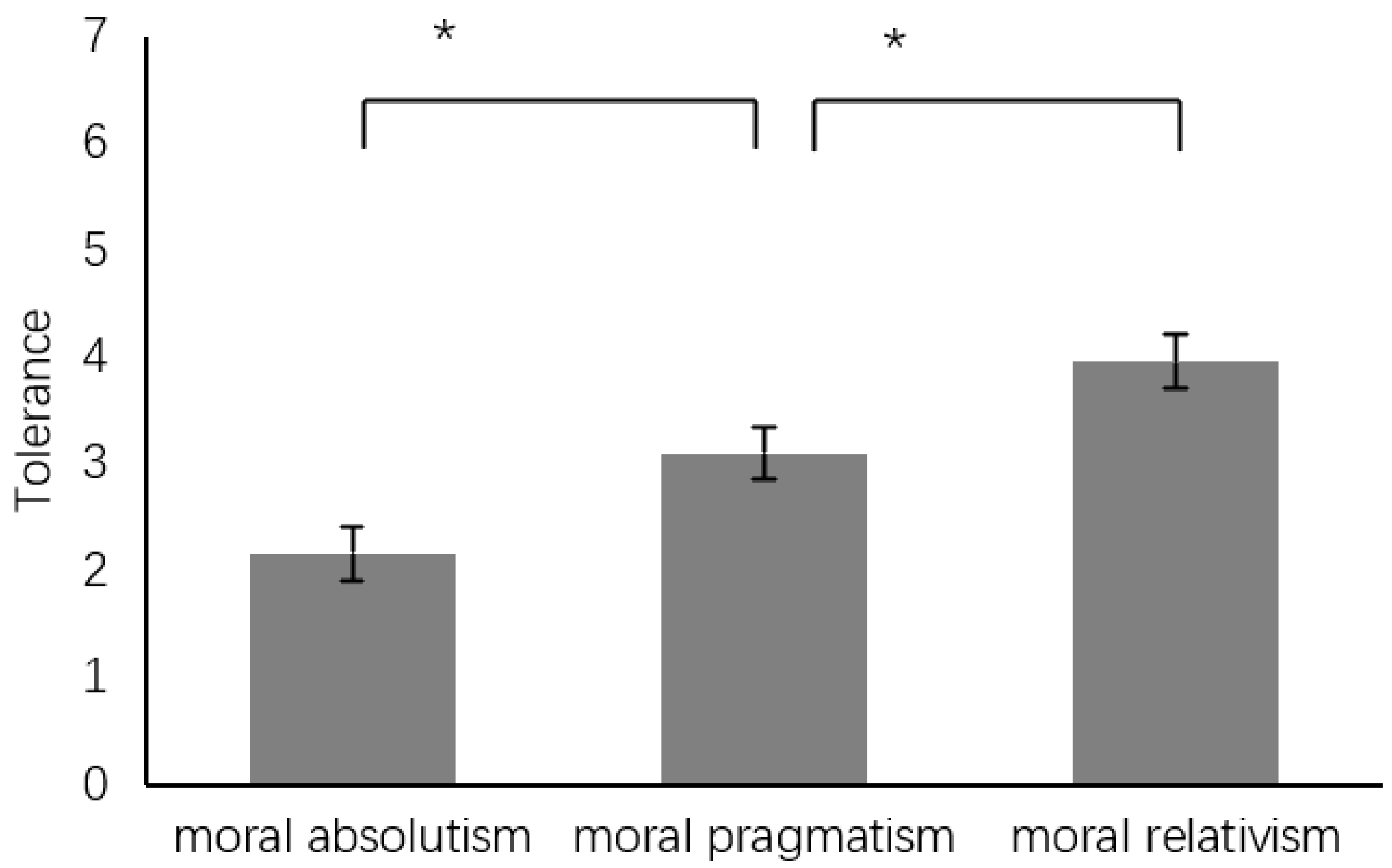
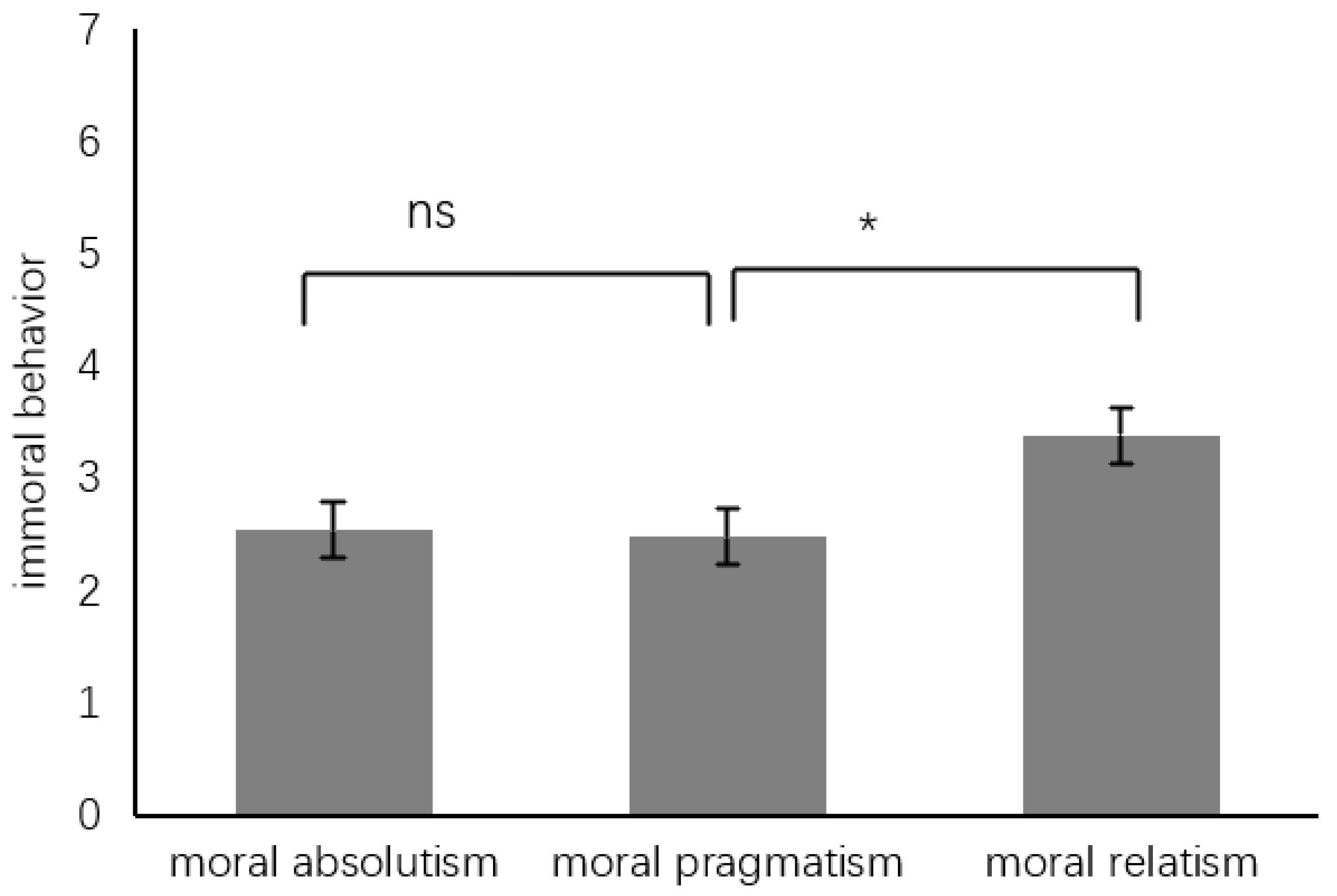
| Scenario | Variables | Group | M | SD | df | t | p-Value | Cohen’s d |
|---|---|---|---|---|---|---|---|---|
| Birth Control | Judgment | AVG | 5.94 | 1.10 | 152 | 2.17 | <0.05 * | 0.35 |
| SPG | 5.60 | 0.84 | ||||||
| Universal | AVG | 5.06 | 1.36 | 152 | 3.90 | <0.01 ** | 0.66 | |
| SPG | 4.00 | 1.82 | ||||||
| Polygamy | Judgment | AVG | 6.27 | 0.91 | 136 | 6.07 | <0.001 *** | 1.08 |
| SPG | 5.24 | 1.00 | ||||||
| Universal | AVG | 5.20 | 1.49 | 136 | 5.78 | <0.001 *** | 1.02 | |
| SPG | 3.57 | 1.70 | ||||||
| Land Reform | Judgment | AVG | 5.77 | 0.86 | 173 | 0.55 | 0.58 | 0.09 |
| SPG | 5.84 | 0.78 | ||||||
| Universal | AVG | 4.79 | 1.57 | 173 | 2.95 | <0.01 ** | 0.45 | |
| SPG | 4.05 | 1.71 |
| Variables | Group | M | SD | df | F | p-Value | η2 |
|---|---|---|---|---|---|---|---|
| Judgment | AAV | 6.28 | 0.88 | 193 | 483.21 | <0.001 *** | 0.83 |
| ASS | 5.56 | 0.92 | |||||
| DSS | 2.15 | 0.74 | |||||
| Outrage | AAV | 5.35 | 1.36 | 193 | 19.93 | <0.001 *** | 0.17 |
| ASS | 3.59 | 1.71 | |||||
| DSS | 5.00 | 1.34 | |||||
| Tolerance | AAV | 2.43 | 1.18 | 193 | 18.42 | <0.001 *** | 0.16 |
| ASS | 3.72 | 1.43 | |||||
| DSS | 2.34 | 1.01 |
| Scenario | Variables | Group | M | SD | df | F | p-Value | η2 |
|---|---|---|---|---|---|---|---|---|
| Birth Control | Judgment | AVG | 6.32 | 0.67 | 192 | 12.10 | <0.001 *** | 0.11 |
| VCG | 5.71 | 0.86 | ||||||
| SPG | 5.80 | 0.79 | ||||||
| Universal | AVG | 5.20 | 1.51 | 192 | 15.67 | <0.001 *** | 0.14 | |
| VCG | 4.76 | 1.45 | ||||||
| SPG | 3.76 | 1.90 | ||||||
| Attitude Change | AVG | 2.81 | 1.74 | 192 | 26.46 | <0.001 *** | 0.22 | |
| VCG | 4.52 | 1.40 | ||||||
| SPG | 4.60 | 1.67 | ||||||
| Polygamy | Judgment | AVG | 6.29 | 1.10 | 218 | 24.08 | <0.001 *** | 0.18 |
| VCG | 6.16 | 0.69 | ||||||
| SPG | 4.97 | 1.19 | ||||||
| Universal | AVG | 5.13 | 1.43 | 218 | 35.50 | <0.001 *** | 0.25 | |
| VCG | 5.30 | 1.31 | ||||||
| SPG | 2.93 | 1.81 | ||||||
| Attitude Change | AVG | 2.49 | 1.61 | 218 | 27.86 | <0.001 *** | 0.20 | |
| VCG | 3.60 | 2.12 | ||||||
| SPG | 5.09 | 1.16 | ||||||
| Land Reform | Judgment | AVG | 5.97 | 0.78 | 199 | 4.43 | <0.05 * | 0.04 |
| VCG | 5.61 | 0.78 | ||||||
| SPG | 6.07 | 0.69 | ||||||
| Universal | AVG | 4.86 | 1.46 | 199 | 2.28 | =0.10 | 0.02 | |
| VCG | 4.31 | 1.69 | ||||||
| SPG | 4.37 | 1.72 | ||||||
| Attitude Change | AVG | 3.04 | 1.57 | 199 | 24.68 | <0.001 *** | 0.20 | |
| VCG | 4.26 | 1.93 | ||||||
| SPG | 4.79 | 1.56 |
| Variables | Group | M | SD | df | F | p-Value | η2 |
|---|---|---|---|---|---|---|---|
| Persuasiveness | MRG | 4.64 | 1.76 | 147 | 5.66 | <0.01 ** | 0.08 |
| MPG | 5.10 | 1.49 | |||||
| MAG | 5.68 | 1.38 | |||||
| Attitude Change | MRG | 3.60 | 1.74 | 147 | 0.45 | 0.64 | 0.01 |
| MPG | 3.32 | 1.73 | |||||
| MAG | 3.64 | 2.02 | |||||
| Tolerance | MRG | 3.96 | 1.99 | 147 | 13.21 | <0.001 *** | 0.15 |
| MPG | 3.10 | 1.87 | |||||
| MAG | 2.16 | 1.33 | |||||
| Immoral Behavior | MRG | 3.38 | 1.87 | 147 | 4.51 | <0.05 * | 0.06 |
| MPG | 2.48 | 1.53 | |||||
| MAG | 2.54 | 1.61 |
Disclaimer/Publisher’s Note: The statements, opinions and data contained in all publications are solely those of the individual author(s) and contributor(s) and not of MDPI and/or the editor(s). MDPI and/or the editor(s) disclaim responsibility for any injury to people or property resulting from any ideas, methods, instructions or products referred to in the content. |
© 2024 by the authors. Licensee MDPI, Basel, Switzerland. This article is an open access article distributed under the terms and conditions of the Creative Commons Attribution (CC BY) license (https://creativecommons.org/licenses/by/4.0/).
Share and Cite
Zhang, L.; Tong, S.; Peng, K. Moral Believer or Moral Problem-Solver? Moral Pragmatism Fosters Tolerance Without Impeding Moral Behavior. Behav. Sci. 2024, 14, 984. https://doi.org/10.3390/bs14110984
Zhang L, Tong S, Peng K. Moral Believer or Moral Problem-Solver? Moral Pragmatism Fosters Tolerance Without Impeding Moral Behavior. Behavioral Sciences. 2024; 14(11):984. https://doi.org/10.3390/bs14110984
Chicago/Turabian StyleZhang, Li, Song Tong, and Kaiping Peng. 2024. "Moral Believer or Moral Problem-Solver? Moral Pragmatism Fosters Tolerance Without Impeding Moral Behavior" Behavioral Sciences 14, no. 11: 984. https://doi.org/10.3390/bs14110984
APA StyleZhang, L., Tong, S., & Peng, K. (2024). Moral Believer or Moral Problem-Solver? Moral Pragmatism Fosters Tolerance Without Impeding Moral Behavior. Behavioral Sciences, 14(11), 984. https://doi.org/10.3390/bs14110984






